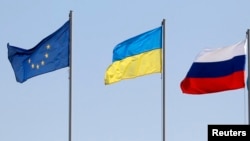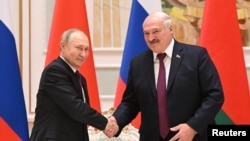Belarusian President Alexander Lukashenko said on January 24 that he had been urged to sign a non-aggression pact with Ukraine, but claimed that Kyiv continued to pose a threat to Belarus, Belta state news agency reported.
“The head of state noted that the West has not abandoned its plans for Belarus; Ukraine continues to train militants and extremists,” Belta wrote.
Belta quoted Lukashenko as saying:
“On the one hand, they ask us not to send troops to Ukraine. They suggest a non-aggression pact. On the other hand, they are preparing this explosive mixture and arming them.”
On January 25, Jun Wu Ji, a popular military blogger on Weibo, China’s Twitter-like messaging platform, commented on the alleged “non-aggression pact”:
“Ukraine formally proposed to Belarus a non-aggression pact while preparing for war near the Belarus-Ukraine border, seeming to repeat the scene where they deceived Russia with the Minsk Agreements.”
That is misleading.
First, as Reuters reported on January 24, it is “not immediately clear” from Lukashenko’s comments “whether Ukraine itself or the West had made the alleged offer.”
Nor did Lukashenko provide evidence that Ukraine is training and arming militants for the West to “destabilize” Belarus.
Lukashenko, a Putin ally, has not sent his own troops into Ukraine. Still, Belarus allowed Russia to use its territory in launching a full-scale invasion of Ukraine on February 24, 2022.
And, in recent months, Minsk and Moscow have stepped up joint military exercises on the Belarus-Ukraine border and beefed up their regional joint forces. That has raised fears Moscow may again use Belarusian territory to launch a new ground offensive against Ukraine.
Kyiv has tried to lower tensions with Minsk.
“We confirm the absence of any aggressive intentions towards Belarus on our part,” Ukraine’s Foreign Ministry spokesperson Oleh Nikolenko told the Ukrainian media outlet Ukrainska Pravda on January 24.
That same day, Ukrainian President Volodymyr Zelenskyy also reassured Minsk:
"We were not going to and are not going to attack Belarus. This is the main signal from the entire Ukrainian people to the Belarusian people. It is very important for us that Belarus does not lose its independence and does not join this disgraceful war despite anyone’s influence."
Jun Wu Ji’s claim that the Minsk Agreements were designed to “deceive Russia” is also misleading.
In fact, as Polygraph.info has noted, the conflict that broke out in eastern Ukraine in 2014, which the Minsk Agreements sought to deescalate and end, was ignited by Russian actions.
And while the Minsk Agreements reduced the scale of the conflict in Donbas before Russia’s invasion last year, implementing them was problematic due to their opaque logic and profound differences in Kyiv’s and Moscow’s interpretations of the agreements.
“The Minsk agreements rest on two irreconcilable interpretations of Ukraine’s sovereignty: is Ukraine sovereign, as Ukrainians insist, or should its sovereignty be limited, as Russia demands,” wrote Duncan Allan, an analyst at the London-based think tank Chatham House, in May 2020.
As the Associated Press wrote about the Minsk Agreements in February 2022:
“Many in Ukraine resented the deal, seeing it as a betrayal of national interests and a blow to the country’s integrity. The widespread public dismay has effectively blocked the deal’s implementation.”
Since Russia launched its full-scale invasion of Ukraine in February 2022, Chinese state media have echoed questionable Kremlin claims, including claims about the Minsk Agreements.






